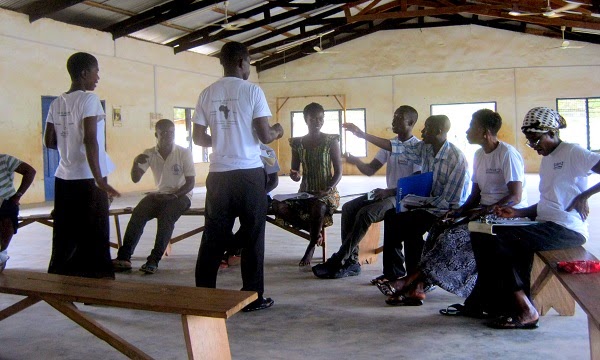Our CHWs are comprised of a balanced mix of men and women of varied ages, who come from different areas within their communities. They are a diverse group; and together they are trusted by a large population. Yaa Mary is a veteran CHW who has been with GHEI for many years. Speaking with her before the retreat started, she mentioned that she enjoyed being a CHW: saying that it is good work but also gives her an important skill. Yaa Mary has increased her knowledge about healthcare and knows how to protect her family from malaria.
 GHEI CHWs normally work alone. They are given a list of houses to conduct follow-up visits on; making sure bednets are properly mended, hung correctly, and everybody in the home knows how to use them. The retreat gave them an opportunity to talk shop. They considered challenges they’ve encountered, possible solutions and shared their individual best practices during follow-up visits. These were lively conversations where almost everybody was sharing their thoughts on each previous contribution.
GHEI CHWs normally work alone. They are given a list of houses to conduct follow-up visits on; making sure bednets are properly mended, hung correctly, and everybody in the home knows how to use them. The retreat gave them an opportunity to talk shop. They considered challenges they’ve encountered, possible solutions and shared their individual best practices during follow-up visits. These were lively conversations where almost everybody was sharing their thoughts on each previous contribution.In an effort to improve our Malaria Prevention program, the CHWs’ follow-up visit protocol has changed in the last year. Early on in the retreat, everybody worked through two sample follow-up visits. The health staff acted out various scenarios during a home visit, while the CHWs all filled out their forms, then came together to make sure that they agreed on the same result. They practiced their new protocol, identified potential problem areas and decided upon solutions.
 On the second day, they took a trip to the capital of our district, Bibiani, to learn more about malaria and the parasite that causes it. Once there, they started the day with a challenging game of Malaria Jeopardy. At the district hospital, they met Sargent Doe, a good friend of GHEI’s, at the blood lab. The CHWs were given a tour and a demonstration of the lab’s malaria test. Everybody got the opportunity to inspect both healthy and malaria-ridden blood through the microscope and learn how to differentiate between the two. While no GHEI CHW will be performing blood tests anytime soon, the lesson increased interest in malaria prevention and each CHW’s confidence in educating the population against malaria.
On the second day, they took a trip to the capital of our district, Bibiani, to learn more about malaria and the parasite that causes it. Once there, they started the day with a challenging game of Malaria Jeopardy. At the district hospital, they met Sargent Doe, a good friend of GHEI’s, at the blood lab. The CHWs were given a tour and a demonstration of the lab’s malaria test. Everybody got the opportunity to inspect both healthy and malaria-ridden blood through the microscope and learn how to differentiate between the two. While no GHEI CHW will be performing blood tests anytime soon, the lesson increased interest in malaria prevention and each CHW’s confidence in educating the population against malaria. Even after a tiring couple of days, the retreat left everybody refreshed and motivated. When asked what their goals were for the next year, many answered that they wanted to commit themselves to their work, because as Soroano CHW Yaw Ntori put it, “If we use all the skills we’ve learned here, we can get rid of malaria.”
Share |


No comments:
Post a Comment